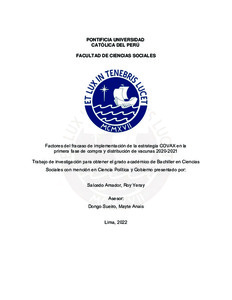| dc.contributor.advisor | Dongo Sueiro, Mayte Anais | |
| dc.contributor.author | Salcedo Amador, Roy Yeray | |
| dc.date.accessioned | 2024-01-29T20:39:25Z | |
| dc.date.available | 2024-01-29T20:39:25Z | |
| dc.date.created | 2022 | |
| dc.date.issued | 2024-01-29 | |
| dc.identifier.uri | http://hdl.handle.net/20.500.12404/26984 | |
| dc.description.abstract | La iniciativa COVAX se desplegó con el fin de ofrecer un mecanismo efectivo para
realizar la adquisición de vacunas contra el Covid-19, así como de entregar dosis a
aquellos países con menor capacidad económica. Sin embargo, en la práctica esto no
ha funcionado y COVAX no ha conseguido las dosis necesarias para lograr el
cumplimiento de sus metas en cuanto a distribución de dosis. En ese sentido, resulta de
interés analizar qué factores hubo de por medio en este fracaso de la cooperación.
En consecuencia, la actual exploración presentará un estudio de caso cuyo objetivo es
responder a la pregunta ¿Qué factores incidieron en el fracaso de COVAX durante su
primera fase en el periodo 2020-2021? Se propone usar la perspectiva ofrecida por el
realismo dado que se hace énfasis en Estados que invocan el principio de soberanía
y optan por el interés nacional sobre la cooperación como medio para combatir los
efectos de la pandemia. Usando metodología cualitativa y cuantitativa de tipo estudio
de caso, es posible proponer tres factores. En primer lugar, la firma de acuerdos
unilaterales por parte de países desarrollados. Por otra, el manejo político de las
vacunas a través de la ‘’Diplomacia de vacunas’’ por parte de potencias emergentes.
Finalmente, la existencia de dificultades técnicas en la distribución. Entonces, a través
de la compilación de fuentes primarias y secundarias, será posible entender la
incidencia de los factores mencionados en el fracaso inicial de COVAX. | es_ES |
| dc.description.abstract | The COVAX initiative was deployed to provide an effective mechanism for purchasing
Covid-19 vaccines, as well as to provide doses to countries with lower economic
capacity. However, in practice this has not worked and COVAX has not been able to
procure the doses needed to achieve its dose distribution goals. In this way, it is of
importance to analyze what factors were involved in this failure of cooperation.
Consequently, the actual investigation is a case study that aims to answer the
question: What factors were involved in the failure of COVAX during its first phase in
the period 2020-2021? It is proposed to use the perspective offered by realism given
that emphasis is placed on States that invoke the principle of sovereignty and opt for
national interest over collaboration as a means to fase the consequences of the
infection. Through a qualitative case study methodology, it is possible to propose three
factors. First, the signing of unilateral agreements by developed countries. Secondly,
the political management of vaccines through ''vaccine diplomacy'' by emerging
powers. Finally, the existence of technical difficulties in distribution. Then, through the
compilation of primary and secondary data and information, it will be possible to
understand the incidence of those mentioned factors in causing the initial failure of
COVAX. | es_ES |
| dc.language.iso | spa | es_ES |
| dc.publisher | Pontificia Universidad Católica del Perú | es_ES |
| dc.rights | info:eu-repo/semantics/openAccess | es_ES |
| dc.rights.uri | http://creativecommons.org/licenses/by-nc-sa/2.5/pe/ | * |
| dc.subject | COVID-19 (Enfermedad) | es_ES |
| dc.subject | Vacunas--Cooperación internacional | es_ES |
| dc.subject | Seguridad internacional | es_ES |
| dc.title | Factores del fracaso de implementación de la estrategia COVAX en la primera fase de compra y distribución de vacunas 2020-2021 | es_ES |
| dc.type | info:eu-repo/semantics/bachelorThesis | es_ES |
| thesis.degree.name | Bachiller en Ciencias Sociales con mención en Ciencia Política y Gobierno | es_ES |
| thesis.degree.level | Bachillerato | es_ES |
| thesis.degree.grantor | Pontificia Universidad Católica del Perú. Facultad de Ciencias Sociales | es_ES |
| thesis.degree.discipline | Ciencias Sociales con mención en Ciencia Política y Gobierno | es_ES |
| renati.advisor.dni | 44028556 | |
| renati.advisor.orcid | https://orcid.org/0000-0002-4355-3751 | es_ES |
| renati.author.dni | 72653667 | |
| renati.discipline | 312026 | es_ES |
| renati.level | https://purl.org/pe-repo/renati/level#bachiller | es_ES |
| renati.type | https://purl.org/pe-repo/renati/type#trabajoDeInvestigacion | es_ES |
| dc.publisher.country | PE | es_ES |
| dc.subject.ocde | https://purl.org/pe-repo/ocde/ford#5.06.00 | es_ES |






